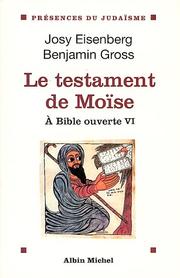| Listing 1 - 2 of 2 |
Sort by
|

ISSN: 0755169X ISBN: 2226084568 2226006117 9782226006110 9782226084569 Year: 1978 Volume: 6 Publisher: Paris: Albin Michel,
Abstract | Keywords | Export | Availability | Bookmark
 Loading...
Loading...Choose an application
- Reference Manager
- EndNote
- RefWorks (Direct export to RefWorks)
La personnalité de Moïse tient une place unique dans l'histoire et la tradition juives. Prophète, fidèle porte-voix de Dieu, il libère le peuple juif de son esclavage en Égypte pour le conduire en Canaan, à l'orée de la Terre promise. Seul homme à avoir dialogué en "face-à-face" avec Dieu, il accomplit une oeuvre fondamentale de législateur dont rendent compte les quatre premiers livres de la Bible. Ce n'est qu'au cinquième livre, sentant sa mort prochaine, qu'il prend personnellement la parole. Ainsi naît le Deutéronome : l'homme de Dieu se fait homme, nous livre ses états d'âme et sa propre vision de l'histoire. Livre étonnant où se mêlent tous les genres littéraires, où le prophète apparaît tour à tour comme mémorialiste, témoin, juge, législateur, moraliste, mais aussi Cassandre, prophète du bonheur et visionnaire. Son regard embrasse alors les siècles. Avec une stupéfiante précision, il prédit les ombres et les lumières du destin tourmenté du peuple juif. Écrit par Josy Eisenberg, rabbin, historien, écrivain, producteur et réalisateur de télévision, associé à Benjamin Gross, docteur en philosophie, doyen honoraire de la faculté de Lettres et Sciences humaines de l'université Bar-Ilan, Le Testament de Moise constitue une indispensable voie d'accès à la compréhension du lien qui unit le peuple biblique d'Israël à l'État d'Israël dans la géopolitique d'aujourd'hui.
Moses --- Bible. --- Criticism, interpretation, etc. --- #GGSB: Jodendom --- Bible OT. Pentateuch. Genesis --- 222.2 --- #GGSB: Bijbel --- Genesis --- Moïse --- Moiseĭ --- Moisés --- Mosè --- Mosheh --- Mosheh, --- Mosis --- Moyshe, --- Mózes --- Mūsá --- Nabī Mūsá --- משה --- משה, --- Deuteronomium (Book of the Old Testament) --- Deuteronomy (Book of the Old Testament) --- Devarim (Book of the Old Testament) --- Kitāb-i Divārīm (Book of the Old Testament) --- Shinmeiki (Book of the Old Testament) --- Sifr al-Tathniyah (Book of the Old Testament) --- Sinmyŏnggi (Book of the Old Testament) --- Tas̲niyah (Book of the Old Testament) --- Tathniyah (Book of the Old Testament) --- Jewish religion --- Religion juive --- Judaisme --- Bible --- Criticism, interpretation, etc --- Judaïsme --- Bijbel --- Jodendom
Book
ISBN: 3110408562 9783110408560 9783110409215 9783110409307 3110409216 3110409305 Year: 2018 Volume: 215 Publisher: Berlin: de Gruyter,
Abstract | Keywords | Export | Availability | Bookmark
 Loading...
Loading...Choose an application
- Reference Manager
- EndNote
- RefWorks (Direct export to RefWorks)
This book examines the use of the term σήμερον (“today”) in Luke-Acts (22 occurrences), the Pauline letters (Romans 11:8; 2 Corinthians 3:14, 15) and the Epistle to the Hebrews (1:5; 3:7, 13, 15; 4:7 [twice]); 5:5; 13:8). It gives special attention to the possible influence of the Deuteronomic "today" in the New Testament. Two main hypotheses are at the heart of this study. First, the word "today," in Deuteronomy as well as the three New Testament corpora under consideration, becomes a theological theme of its own. Second, in the minds of the three New Testament authors who give attention to this motif, there seems to be an awareness of certain theological associations that are bound up with the Deuteronomic "today." By the end of this investigation, it becomes apparent that Luke’s today, Paul’s today and the today of the Epistle to the Hebrews, while each possessing unique characteristics, all contribute to emphasize the same key theological concepts, such as the fulfillment of Scripture, an inaugurated and progressively realized eschatology, the coming of salvation, the heralding of the good news and the proclaiming of God’s Word.
Sēmeron (The Greek word) --- Intertextuality in the Bible --- 226.6 --- 227.1*9 --- Greek language --- 227.1*9 Brief van Paulus aan de Hebreeën --- Brief van Paulus aan de Hebreeën --- 226.6 Actes des apotres --- 226.6 Handelingen der apostelen. Akten van de apostelen --- Actes des apotres --- Handelingen der apostelen. Akten van de apostelen --- Etymology --- Bible. --- Epistle to the Hebrews --- Hebräerbrief (Book of the New Testament) --- Hebrews (Book of the New Testament) --- Poslanie do Evreite (Book of the New Testament) --- Risālah ilá al-ʻIbrānīyīn (Book of the New Testament) --- Epistles of Paul --- Paul, Epistles of --- Paul Sŏsin --- Pauline epistles --- Risālat al-Qiddīs Būlus al-rasūl al-thāniyah ilá Tīmūthīʼūs --- Acts (Book of the New Testament) --- Acts of the Apostles --- Chongdo haengjŏn --- Sado haengjŏn --- Luc (Book of the New Testament) --- Lucas (Book of the New Testament) --- Luka (Book of the New Testament) --- Lukan săn zăn︠g︡g (Book of the New Testament) --- Lukas (Book of the New Testament) --- Luke (Book of the New Testament) --- Lūqā (Book of the New Testament) --- Nuga pogŭm (Book of the New Testament) --- Ruka den --- Ruka ni yoru fukuinsho --- Deuteronomium (Book of the Old Testament) --- Deuteronomy (Book of the Old Testament) --- Devarim (Book of the Old Testament) --- Kitāb-i Divārīm (Book of the Old Testament) --- Shinmeiki (Book of the Old Testament) --- Sifr al-Tathniyah (Book of the Old Testament) --- Sinmyŏnggi (Book of the Old Testament) --- Tas̲niyah (Book of the Old Testament) --- Tathniyah (Book of the Old Testament) --- Ba-yon Tipan --- Bagong Tipan --- Jaji ma Hungi --- Kainē Diathēkē --- New Testament --- Nouveau Testament --- Novo Testamento --- Novum Testamentum --- Novyĭ Zavet --- Novyĭ Zavi︠e︡t Gospoda nashego Īisusa Khrista --- Novyĭ Zavit --- Nuevo Testamento --- Nuovo Testamento --- Nye Testamente --- Perjanjian Baru --- Dhamma sacʻ kyamʻʺ --- Injīl --- Relation to the Old Testament. --- Quotations in the New Testament. --- Criticism, interpretation, etc.
| Listing 1 - 2 of 2 |
Sort by
|

 Search
Search Feedback
Feedback About UniCat
About UniCat  Help
Help News
News